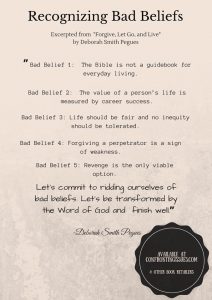Recognizing Bad Beliefs
In July 2007, Police Officer Christopher Dorner and his partner were called to a public disturbance where a disorderly, mentally challenged man was creating a nuisance. Dorner later reported to department officials that his partner had used excessive force during the arrest, kicking the man in the face while he was handcuffed. The department investigated the incident and decided that Dorner’s claim was not true. They fired him in 2008 for making a false report.
He charg ed racism and appealed his case for job reinstatement. He exhausted every level of the police department’s appeals process to no avail. He went on to file a wrongful termination lawsuit through local and state courts; they upheld the department’s decision.
ed racism and appealed his case for job reinstatement. He exhausted every level of the police department’s appeals process to no avail. He went on to file a wrongful termination lawsuit through local and state courts; they upheld the department’s decision.
In February 2013, consumed with rage, Dorner decided his only option was to retaliate. He went on a shooting spree from February 2 through February 12 against specific officers and their families. He killed four people, including three police officers, and wounded four other officers. He became the subject of the largest manhunt in the history of the police department. Acting on a tip, the police finally tracked him to a cabin in the mountains. He died there on February 12, 2013, from a self-inflicted gunshot wound to the head during a standoff with the police. He was 33 years old.
In reading Dorner’s manifesto which he had mailed to the media before starting his shooting spree, I observed five toxic, erroneous, and overall “bad beliefs” that ultimately derailed his destiny and caused untold heartache for his family and the families of his victims. The truth is that any of us could fall prey to these beliefs. We all behave according to what we believe. Thus, it pays to “audit” our beliefs often to know what is motivating our behavior.

